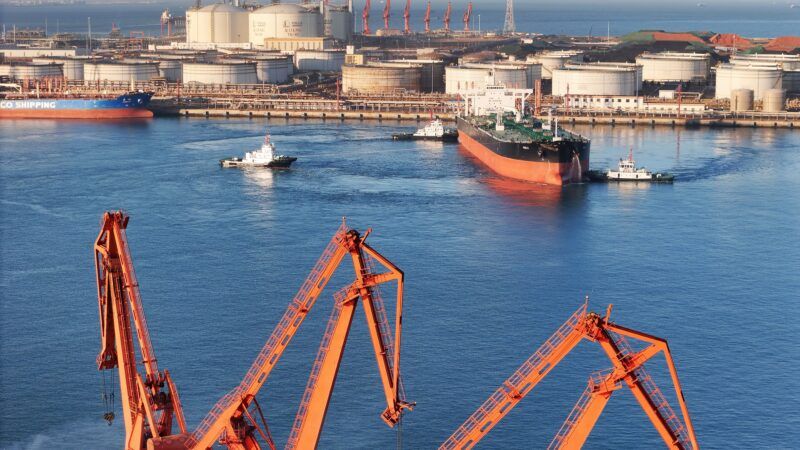Does Trump Want Lower Gas Prices or Oil Sanctions on Iran?
The Trump administration’s math on Middle Eastern energy supplies just doesn’t add up.

The law of supply and demand is the most basic insight in economics. When there's more of a good available for sale than people who want to buy it, the price goes down, and when more people want to buy the good than is available, the price goes up. As progressives have learned the hard way with housing, there is no magical government intervention to get around this.
That law presents a bit of a problem for President Donald Trump's agenda on oil. On one hand, Trump ran on criticisms of Biden-era inflation, including high gas prices. He also wants to drive down oil prices to pressure Russia. On the other hand, Trump wants to cut off Iranian oil exports in order to "bankrupt" the country and build leverage in negotiations.
In other words, he's trying to both increase and reduce the oil supply at the same time.
Last week, the Trump administration claimed that it found a way to square the circle. The government of Iraq suddenly announced last Monday that it would resume exporting Kurdish oil after resolving a years-long revenue-sharing dispute with the autonomous region of Kurdistan. Several Iraqi and U.S. officials told Reuters on Friday that the announcement was actually part of the pressure campaign against Iran.
The Trump administration had threatened to add Iraq as a sanctions target unless it increased oil exports to offset the expected drop in Iranian exports, the officials claimed. "It's not only important for regional security that our Kurdish partners be allowed to export their own oil but also help keep the price of gas low," a White House official told Reuters.
But the math doesn't add up. The Trump administration is expecting to cut Iranian oil exports by 90 percent, from 1.5 million barrels per day to 100,000 barrels per day, U.S. Treasury Secretary Scott Bessent says. Iraqi Kurdish oil exports are expected to be only 185,000 barrels per day, according to Iraq's oil ministry. Even by the official numbers, that's a 1.2 million barrel per day supply cut.
The real gap may be larger. Iran is now exporting 1.74 million barrels a day to China alone, Bloomberg reported last week, citing data from the market intelligence firm Kpler. And although Kurdish oil exports were officially shut down, some of the oil was already reaching international markets illegally. Reuters reported in July 2024 that around 200,000 barrels of Kurdish oil per day were being smuggled into Iran and Turkey by truck.
Of course, Kurdistan is not the only other place in the world that exports oil, and it's possible that other supply increases make up the gap. During the extreme tensions of the first Trump administration, when the United States started seizing Iranian oil tankers and Iran began sabotaging Arab oil infrastructure, oil prices didn't budge by much. The shale oil boom in North America has made Middle Eastern oil far less relevant, and Trump has promised to "unleash" American oil and gas production.
But the Trump administration's foreign policy is aggressively threatening oil supplies from elsewhere. Last month, Trump threatened 10 percent tariffs on Canadian oil and gas. Canada currently exports over 4 million barrels of crude oil per day to the United States alone. If he followed through on that threat, gas prices could have increased by 10 to 30 cents per gallon, Nick Loris of the energy think tank C3 Solutions told Reason.
It's also possible that U.S. sanctions are less effective at cutting Iranian exports than the Trump administration expected. Bessent based his prediction of a 90 percent export reduction on the first Trump era. Since then, Iranian oil dealers have gotten much better at avoiding U.S. sanctions. And while Chinese companies have tried to obey U.S. sanctions in public—in order to keep their access to American markets open—they've also been happy to deal with sanctioned oil under the table.
For example, the Chinese port of Shandong officially banned all sanctioned vessels in January, then told oil importers that "it expects the shipping ban to have a limited impact on independent refiners as most of the sanctioned oil is being carried on non-sanctioned tankers," according to documents obtained by Reuters. (Chinese buyers often use a complex system of ship-to-ship transfers and "ghost ships" to hide the origin of their oil.) Meanwhile, other Chinese ports have started taking in Iranian vessels, Kpler reported last month.
Trump himself admitted on the campaign trail that U.S. sanctions simply aren't as effective as they used to be. He may be satisfied with a sanctions campaign that looks tough on paper—and allows him to save face while pursuing diplomacy with Iran—but doesn't actually affect the oil market on the ground. After all, Trump backed down on his tariff threat against Canada. He is skilled at being all things to all men.


Show Comments (36)